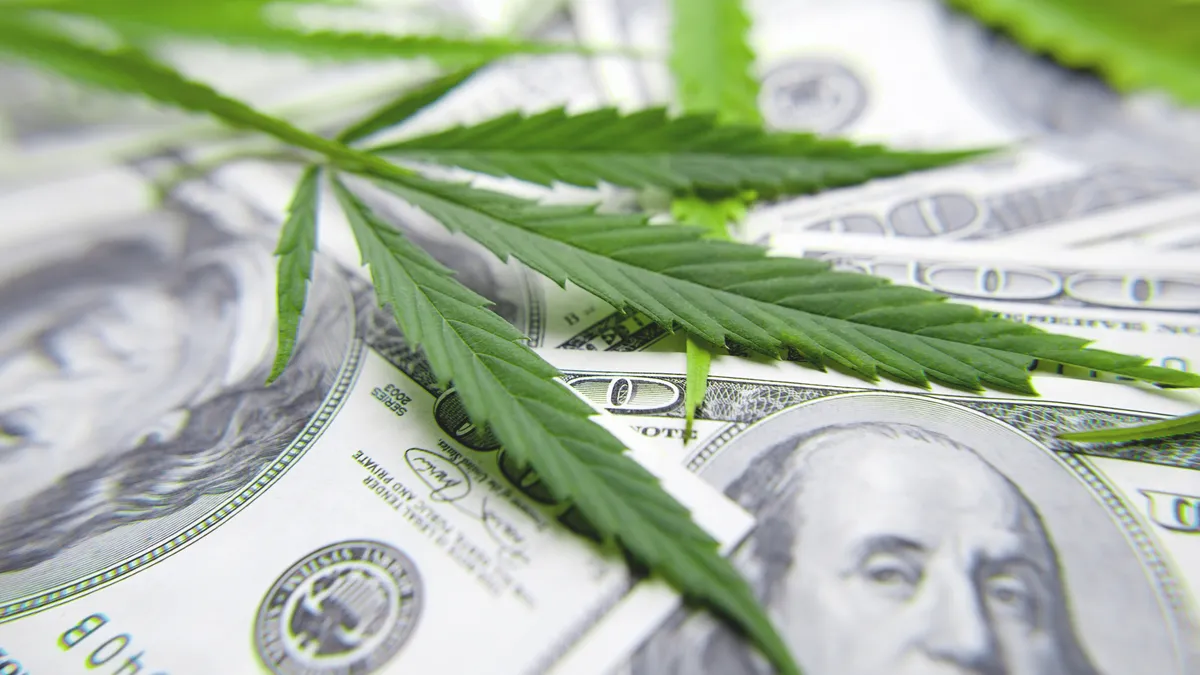UPDATE: May 12, 2020: The Secure and Fair Enforcement (SAFE) Banking Act was included in a $3 trillion coronavirus relief package unveiled by House Democrats on Tuesday afternoon.
"The purpose of this section is to increase public safety by ensuring access to financial services to cannabis-related legitimate businesses and service providers and reducing the amount of cash at such businesses," the bill states.
The SAFE Banking Act’s inclusion in the 1,815-page bill follows multiple calls from lawmakers and industry advocates who say the largely cash-based cannabis industry poses health and safety risks to business owners and consumers.
Dive Brief:
-
Ten cannabis advocacy groups called on Congress to include the Secure and Fair Enforcement (SAFE) Banking Act, or similar language, in the next coronavirus relief package, in an effort to allow the cash-based industry to access banking services.
-
The SAFE Banking Act, which would create protections for financial institutions that provide services to cannabis-related businesses, passed with bipartisan support in the House of Representatives last September, but stalled in the Senate.
-
"The cannabis industry lacks access to banking services that could eliminate cash transactions and minimize virus transmission," the group, which includes Americans for Safe Access, Global Alliance for Cannabis Commerce, and Marijuana Policy Project, among others, wrote in a letter sent to House Speaker Nancy Pelosi, D-CA, and House Minority Leader Kevin McCarthy, R-CA, on Friday.
Dive Insight:
Supporters of the SAFE Banking Act have long cited the dangers that cannabis businesses face as cash-only operations. The current pandemic gives the emerging industry another reason to call for legislative reform in the name of safety.
"The status of cannabis as a Schedule I drug under the Controlled Substances Act blocks legitimate cannabis-related and ancillary businesses from accessing vital financial services, forcing them to operate in an all-cash environment," the group wrote. "[A]s recent reports show that viruses can live on cash for up to 17 days, the public safety concerns of this cash-only system compound."
The lack of access to financial institutions places industry workers, government employees, and the public at-large at risk as banknotes circulate from consumers and patients to businesses, to government, the group added.
Lack of access to banking services also prevents legitimate cannabis-related businesses from obtaining much-needed relief or bank loans amid the pandemic, the group wrote.
"While some businesses saw a brief spike in revenue at the beginning of the pandemic, this was not an industry wide trend and revenues across the industry have since plummeted," the group wrote. "If businesses cannot access the resources to remain operational, patients would be forced into the illicit market of unregulated medicine and transactions. The closure of legitimate businesses would also result in lost state tax revenue."
Rep. Ed Perlmutter, D-CO, a sponsor of the SAFE Banking Act, said he will push for its inclusion, along with other forms of relief for the industry in the next coronavirus relief package.
"[M]any of these businesses are facing disruptions in their supply chain and in normal operations, and they should be eligible for relief just like any other legal, legitimate business during this pandemic," he said in a statement.
The Democrat-controlled House passed the landmark SAFE Banking Act by a 321-103 vote in September, with the support of 229 Democrats and 91 Republicans.
Hopes that the bill would gain support in the Senate hit a roadblock following remarks by Senate Banking Committee Chairman Mike Crapo, R-ID, that he does not support the legislation in its current form.
Crapo said he wants the bill to address broader issues, such as a lack of research and public health and safety issues regarding cannabis.














